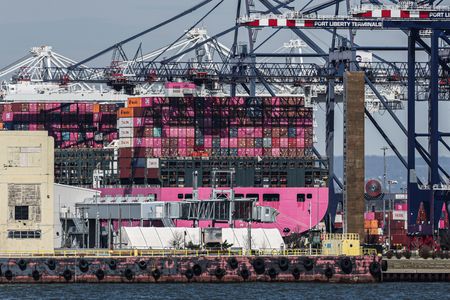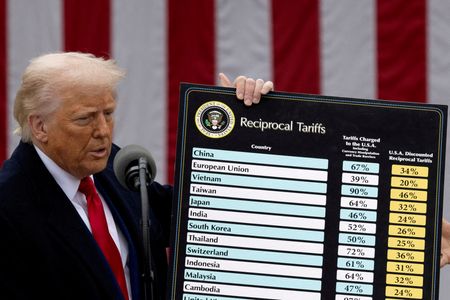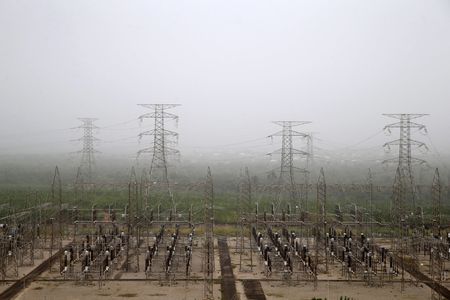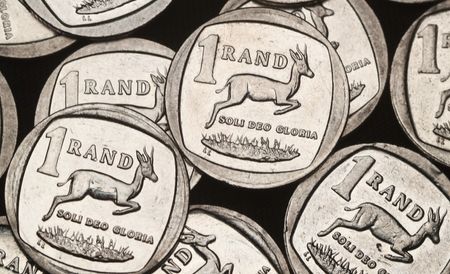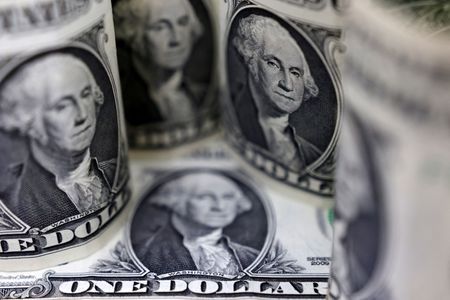By Scott DiSavino
NEW YORK (Reuters) -Oil prices slid about 1% to an eight-week low on Wednesday after U.S. President Donald Trump’s remarks about progress in talks with Moscow created uncertainty on whether the U.S. would impose new sanctions on Russia.
Brent crude futures fell 75 cents, or 1.1%, to settle at $66.89 a barrel, while U.S. West Texas Intermediate crude dropped 81 cents, or 1.2%, to settle at $64.35.
Those moves marked a fifth consecutive day of losses for both crude benchmarks, with Brent closing at its lowest since June 10 and WTI closing at its lowest since June 5.
Trump said on Wednesday that his special envoy Steve Witkoff made “great progress” in his meeting with Russian President Vladimir Putin, as Washington continued its preparations to impose secondary sanctions on Friday.
Trump has threatened additional sanctions on Moscow if no moves are made to end the war in Ukraine.
“Everyone agrees this war must come to a close, and we will work towards that in the days and weeks to come,” Trump said, without providing further details.
Russia is the world’s second-biggest producer of crude after the U.S., so any potential deal that would reduce sanctions would make it easier for Russia to export more oil.
Earlier in the day, oil prices rose after Trump issued an executive order imposing an additional 25% tariff on goods from India, saying it directly or indirectly imported Russian oil. The new import tax will go into effect 21 days after August 7.
India, along with China, is a major buyer of Russian oil.
“For the time being, the 21-day start to the new Indian tariffs, while Russia tries to put together some kind of cease fire agreement ahead of President Trump’s August 8 deadline, still leaves too much uncertainty around the situation,” Bob Yawger, director of energy futures at Mizuho, said in a note.
In addition to the tariff and sanction uncertainty, analysts said a planned OPEC+ supply increase has weighed on the market in recent days.
Indian Prime Minister Narendra Modi, meanwhile, will visit China for the first time in over seven years, a government source said on Wednesday, in a further sign of a diplomatic thaw with Beijing as tensions with the U.S. rise.
In other news, Saudi Arabia, the world’s biggest oil exporter, on Wednesday hiked its September crude oil prices for Asian buyers, the second monthly rise in a row, on tight supply and robust demand.
OIL INVENTORIES
Oil markets found support earlier in the day from a bigger-than-expected decline in U.S. crude inventories last week.
The U.S. Energy Information Administration said energy firms pulled 3 million barrels of crude from inventories during the week ended August 1. [EIA/S] [API/S]
That was much bigger than the 0.6-million-barrel draw analysts forecast in a Reuters poll, but was smaller than the decline of 4.2 million barrels that market sources said the American Petroleum Institute trade group cited in its figures on Tuesday.
(Reporting by Scott DiSavino in New York, Seher Dareen in London, Yuka Obayashi in Tokyo and Jeslyn Lerh in Singapore; Editing by Jane Merriman, Kate Mayberry, Kirsten Donovan, Joe Bavier, Paul Simao, Rod Nickel)


